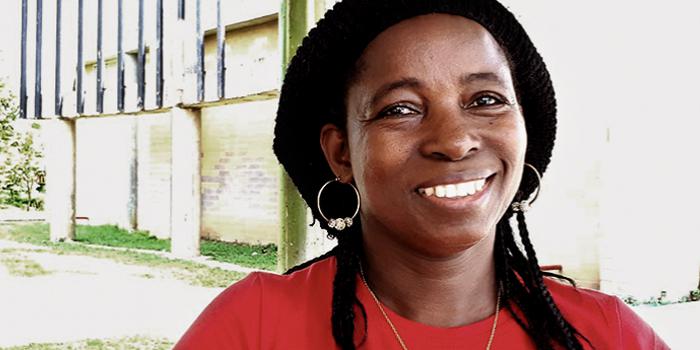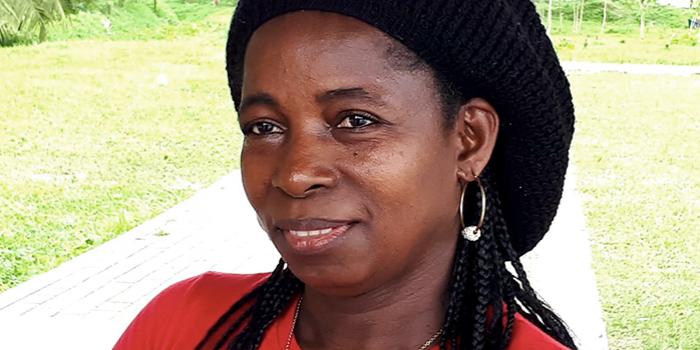
"We have managed to heal the wounds of the soul": Luz Marina Mosquera
This Wednesday, twenty-five years have passed since the community of La Chinita, in Apartadó, lost 35 of its members in one of the worst massacres in the region.


Luz Marina Mosquera has spent her entire life in the Urabá region. "I was born in Riosucio, Chocó, but at the age of eight my mother came with six little boys and came to work at a banana farm near Turbo, as an Casino assistant (kitchen)," he says. "After that, we came to Apartadó and I, from the age of 14, started working as an employee of the internal service in a family home."
In this beautiful green area, privileged point of passage between the Pacific and Atlantic oceans, she meets her husband. "We went to live together in a banana farm where he worked in 1985. Our first daughter was born in 1987, then one more child and then another we adopted," she explains.
The arrival to La Chinita and the massacre
At the beginning of the nineties, the couple settled in Apartadó, the most populated municipality in the region, in search of new opportunities. "We arrived here to invade La Chinita in 1992, which was a rice farm close to Apartadó, and we managed to build our home," he says as he reels his memories.
Children grew up and marriage enjoyed life. Her husband, Antonio Mosquera Velásquez, practiced boxing and played soccer. "As a husband, he made me feel that I was very important in his life; He referred to me as 'honey'; He was very loving, "says Luz Marina.
Everything changed on January 23, 1994.
That day, "Mrs. Rufina Gutiérrez organized a festival to collect money for school supplies for their children. We lived very close with my husband, a very cheerful and cheerful man. That night he went to the meeting with a brother of mine who lived with us and who, at that time, was 15 years old. I did not go to stay with the children and because I did not like the party. "
However, the atmosphere was festive and the neighbors were encouraged. "I stayed at the door of the house sitting on a chair watching the people go to the festival. After a while my husband came and convinced me to go to the meeting. We arrived there and there were many of his companions, from the farm where he worked, "says Luz Marina.
"Around one o'clock in the morning, they start to hear some shots and I tell him to leave and he says no, how calm, which is the Army (so they were uniformed). He decides to hide under a table and I do too, "he recalls. "Shots are heard and someone says 'Don´t shot to women!'".
When, little by little, the calm returns and the shots stop being heard, the marriage comes out from under the table. At that precise moment, they run into two of those who had been shooting and are directed to Antonio.
- -Black, what about you?
- -Please, they're not going to kill him, we have three children, -Luz Marina pleaded.
- - go away.
Without saying more words, "in front of me they give him a bullet in the chest. It began to bleed through the mouth. I went to the house to bring the youngest child, who was three years old, to see if Antonio felt him but he did not, he had already died. Other people who were there saw me too bad that they took the child away from me and then I fainted and lost consciousness, "recalls Luz Marina.
That night, 35 people lost their lives. The armed conflict and the dispute for political control of area left dozens of families broken that would take years to recover. Luz Marina's 15-year-old brother was unharmed.
The pardon to the FARC
The massacre survivors undertook a tireless search for the truth behind what happened. "Since 2009 we started working on the emotional part. Then the Victims Unit arrived and then, in the middle of a peace process between the Government and the FARC, I traveled to Havana together with two women direct victims of La Chinita to a meeting where the FARC negotiators would ask us for forgiveness. Being there we started the dialogue and they said that they had not been directly, but that they had to take responsibility for the events because it had been the fifth front of that organization, "says Luz Marina.
"They asked us for forgiveness, but the three of us said that the pardon should be done in Apartadó, in La Chinita, and publicly acknowledge that they were the authors of what happened. In total we went to Havana three times and later they came here to La Chinita. "
On September 30, 2016, with a symbolic march from the scene and a ceremony at San Pedro Claver school, the FARC acknowledged their responsibility for what happened. "They asked for forgiveness from the direct victims and the community, because the entire community was affected by what happened. Then that day served to help heal the pain, "says Luz Marina firmly.
As for some time, this January, the inhabitants of the Apartadó Obrero neighborhood will once again commemorate the memory and dignity of victims. "With the pardon, the survivors of La Chinita contribute to the peace of Colombia" is the emblematic phrase that other years have chosen to remember this date.
The collective reparation process
"I believe that in the process of collective reparation we have made significant progress and in that sense I highlight the commitment of the Victims Unit, particularly in the case of youth clubs for collective reparation, because that seeks to strengthen the skills of young people, to move them away from risks and improve the perception of them. Another aspect to highlight on the part of the Unit is the psychosocial part. It has been very important because it has led us to be other people. We have managed to heal the wounds of the soul without forgetting what happened and without forgetting our dead, "Luz Marina concluded.






